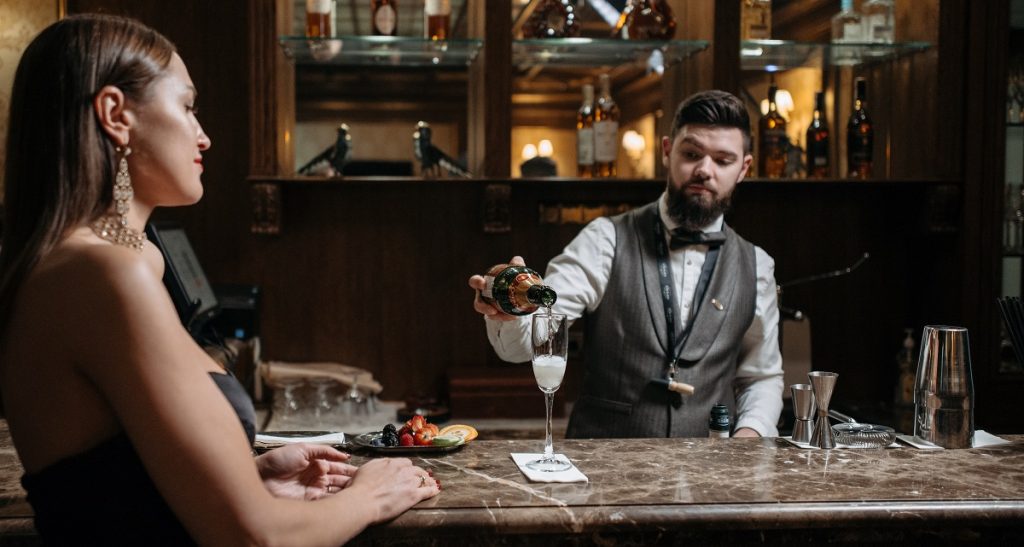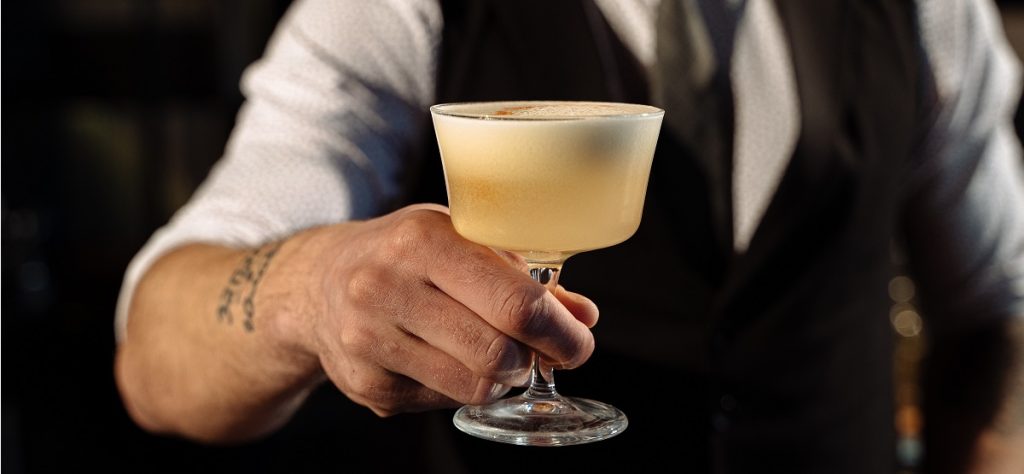Bartender interview questions are a topic that may make new bartenders nervous. After all, interviews are typically difficult to prepare for. Bartenders may get stressed or flustered when dealing with these interview questions.
As a result, people begin to believe the only way to acquire one’s ideal job as a bartender is through extremely hard work and spending hundreds of dollars trying to understand the top tips to acquire such a job.

However, preparing for a job interview doesn’t have to be complex or expensive. In fact, with just a few tips and the right tools, you can be much better prepared for your interview. One such tool is the HIGH5 strengths assessment, which can help you identify your unique strengths and how to leverage them in a bartending role. In this article, we’ll cover the top bartender interview questions, ways to respond, and how understanding your strengths can give you a competitive edge.
What are employers and hiring managers looking for when interviewing people for a bartender role?
If you have ever explored restaurants, you will find that each restaurant has different goals, different customer bases, and different values.
As a result, it may be challenging to know exactly what a restaurant is looking for in an ideal candidate without delving deeper into the company’s history and job description. However, understanding your own strengths through tools like the HIGH5 assessment can give you valuable insights into how you align with common bartender requirements. This self-awareness can help you articulate your unique value proposition during the interview, making you stand out as a candidate who not only meets the job requirements but also brings a distinct set of strengths to the role.
Nonetheless, there are some skills that almost every bartender should have, regardless of which type of restaurant or the restaurant’s location. A few of these crucially important skills are:
Pro Tip From HIGH5
Use your HIGH5 strengths report to identify which of your top strengths align with the key skills employers seek in bartenders. This will help you provide concrete examples of how you’ve successfully applied these strengths in past experiences, making your interview responses more impactful.
Soft skills
Soft skills are a broad category of abilities that exclude technical skills but encompass personality-related, non-technical competencies. For instance, communication is an extremely useful soft skill for bartenders. By taking the HIGH5 strengths assessment, you can identify your top soft skills and understand how they apply to bartending. This knowledge not only helps you highlight your strengths during the interview but also allows you to discuss how you’ve successfully applied these skills in past experiences, making your responses more compelling and relevant.
Bartenders will need to speak with customers and coworkers on a daily basis, and they must do this effectively to stay productive. Another important soft skill would be friendliness or charm, as these enhance the customer experience. Customer service skills in general are considered soft skills.
Organizational skills
There are few jobs in which being disorganized pays off in the long run. For bartenders, disorganization has both immediate and long-term negative consequences. It reduces your efficiency very significantly. In addition, you will also be able to avoid becoming overly frustrated or flustered while at work.
This will allow you to have more positive interactions with customers. Organization can be done through numerous forms, whether it be planning your day in advance or using to-do lists.
Stress resistance
Every job has its stresses. This is certainly true with bartending as well. Individuals who choose this line of work often have to work in a fast-paced environment. They may have to deal with customers who are angry at them for things the bartender cannot control.
And, sometimes the coworkers a bartender must work with further add to their stress. Being able to resist and manage stress has a plethora of benefits. You will better attend to customer needs while also ensuring you have better mental health.
Teamwork
As a bartender, you are an extremely important individual on a team. It is crucial for you to realize that you must work with others to ensure the customers have the best experience possible. Teamwork also helps you build positive relationships with your fellow coworkers.
This allows you to trust one another and more effectively delegate tasks. As a result. You can boost efficiency and have a more enjoyable time at work simultaneously.
Patience
Bartending can undoubtedly get tough at times. There will be moments when a customer escalates tensions with you or another staff member. You must stay patient and calm to resolve such issues, instead of escalating them.
There will also be times when you interact with customers that are just difficult to deal with. They may speak very slowly or ask you to perform certain tasks that are outside of your normal duties. You must remain respectful and courteous when serving such customers.
21 Bartender Interview Questions and Answers
Interviews tend to be one of the most stressful periods for almost any job seeker, and bartenders are no exception. You might wonder if there’s an effective way to combat this stress and truly prepare for an interview without spending hundreds of dollars. The answer is yes! One powerful tool is the HIGH5 strengths assessment. By understanding your unique strengths, you can approach interview questions with confidence, providing answers that authentically represent your abilities. This self-awareness not only helps reduce stress but also allows you to articulate how your specific strengths make you an ideal candidate for the bartending position.
The answer to this question is a resounding yes! One of the best ways to prepare for bartender interviewers is by looking over and understanding potential bartender interview questions. Some of the most common bartender questions include:
1. What is your favorite part of being a bartender?
This question aims to further understand your personality. The interviewer wants to make sure you have a genuine passion for bartending. They do not want to hire someone who just does this work for some extra money or for free drinks.
They want you to enjoy working with customers, pushing yourself, and learning about the restaurant and bar industry. If you touch on these topics or similar ones, they will likely be impressed.
To answer this question, you could say:
“My favorite part of being a bartender is getting to meet so many diverse and interesting people. I have learned a lot about the world and about how to treat others from my time as a bartender. Being able to meet up with people from around the world and make them happy brings joy to me as well.”
2. Have you done any research into our customer base? How would you describe our patrons?
Interviewers want to hire individuals who are prepared. One way you can show your organization and preparedness is to show your knowledge of the bar’s customer base. When describing customers, ensure that you stay respectful.
You would not want to insult the interviewer’s organization or their patrons, even if on accident. You can touch on the patron’s needs and demographics when answering the questions.
One way you could approach answering this question is:
“I have done some research into your customer base, yes. I would say that most of your customers come from the upper level of income, as this is a more upscale bar. They want to feel attended to and like they are visiting a luxury venue while they are at this bar. Many of your patrons are likely professionals in their fields and come after work for a few drinks.”
3. Do you have experience serving customers? If so, what were those customers like?
Experience is almost always nice to have. If you have experience and success working with customers at prior bars, this is your chance to bring up those experiences. In addition, you could also state how those experiences impact you to this day.
You may also want to include how your presence as a bartender helped those specific customers. Ensure you describe the customers in a polite and respectful manner.
A sample answer could be:
“I have worked at numerous bars before applying to this job. My last job was working at a local brewery. Our customers were mostly middle to upper-class, and I worked with numerous beer vendors. I ensured that I listened to the customers and found out a few trends about what they liked. In doing so, I could help make better predictions and suggestions for what a client could try.”
4. Tell me about your bartending training or expertise.
As stated above, being experienced is almost always an advantage to you. So, if you have any particularly impactful experiences in bartending, you should speak about those first. Try to make connections between those experiences and the job you are currently experiencing.
Place the most emphasis on experiences you had that were with clientele similar to that of your goal job’s clientele.
Your answer could be something along the lines of:
“I have had over 10 years of experience as a bartender. I began my work at small local bars, but most recently, I have been hired as a bartender at spots in downtown. There, I met with more wealthier clients and explored more upscale forms of bartending. I believe these experiences helped me understand how to bring the aura of luxury to any bar, and how to bring impeccable service to clients.”
5. Do you have alcohol safety training? If so, what does that training consist of?
Safety is one of the top priorities for any bar. The bar owners never want to see a client intoxicated to the point of being incapable of functioning. Nor do they want to hire individuals who cannot address these situations and cannot ensure they keep everyone else in the bar safe.
You must be someone who has at least some safety knowledge when it comes to alcohol if you wish to acquire non-entry-level bartending jobs. If you have that knowledge, specifically describe it and where you got a certificate or accreditation from.
One way you could answer this question would be:
“I do have alcohol safety training. Just a few years ago, I was certified by ServSafe, a company that educates individuals in the restaurant industry about properly working with alcohol. This was an in-person class led by an accredited professional and I have an alcohol-serving license as a result of performing well on the exam.”
6. Do you have a drink you enjoy making most? Which drink is it?
Some questions asked in a bartender interview will likely be a bit more relaxed than others. For this question, the interviewer simply wants to understand your personality.
They want to understand what makes you enjoy making a drink and if some of your favorite drinks to make are included in their bar.
Depending on your reasoning for choosing the drink, the interviewer gets a peek into what makes you happy and whether that aligns with their team.
To answer this question, you could say something along the lines of:
“The drink I enjoy making most is the margarita. It is undoubtedly a classic, and the people who order it know exactly what they are expecting. I like to add a little twist to the margarita, and it usually surprises the customer, but in a good way. Their surprise always makes me excited to make this drink, and it makes for a more memorable experience than just a standard margarita.”
7. If you were in search if a great cocktail, where would you visit?
With this question, the interviewer is testing how aware you are of the bar market. They want to know if you are aware of their bar’s competition and what you believe makes a bar quality.
Depending on your reasoning for which place you would visit, they will see if your idea of an ideal bar aligns with their notion of one.
What a great cocktail means to you also likely impacts how you would make cocktails for their bar. Thus, they want to ensure you have the right ideas about quality in the bar industry.
In answering this question, you could say something such as:
“I believe that Bar X is one of the best local options for a cocktail besides your bar. The atmosphere in that bar is fantastic; it is very welcoming but also upscale. There are so many great drink varieties and some options that I have never come across before.”
8. Do you know what our specialty dish is? Which drink do think pairs well with it?
A question such as this one tests how much you prepared for the interview. You should be aware of some of the company’s top-selling products and customer base, at the very least.
If you are applying to a restaurant that also has a bar, study their menu and remember their popular drinks. As a bartender, you will likely need to recommend drinks that go along with these entrees.
So, find which drinks would work best alongside that dish and create a short reason for why.
You could answer the question like this:
“Your specialty dish, and the one which most customers review extremely well, is the XY. XY is best accompanied by wine. I would recommend a rich red wine such as Malbec or Barolo if a customer asked me for some advice.”
9. What are the steps to making an Old Fashioned?
This is a straightforward question, and all it is meaning to test is your overall knowledge of bartending. The Old Fashioned is a classic drink that nearly every bartender knows of.
You will prove you have knowledge of basic drink making and mixology by describing how to make an Old Fashioned. By being specific and listing the steps in order, you will confirm your knowledge of bartending techniques.
Your answer could be something along the lines of:
“I have made quite a few Old Fashioneds! First, you take some sugar and Angostura bitters and put them in a glass of water, stirring them. Then you add the ice and bourbon, stirring once again. After that, you strain this mixture over an ice cube. To top it off, you add a little orange twist.”
10. If a customer was looking for dessert drinks, which would you recommend?
Dessert drinks are becoming increasingly more trendy across the US. Many bars are looking to capitalize on this trend, and want to hire individuals who understand the many unique flavors of dessert drinks.
With this question, the interviewer wants to make sure you have knowledge about this type of drink. The drink you choose and your reasoning for it also reveal aspects of your personality.
To answer this question, you could say:
“If a customer asked me about which dessert drinks they should buy, I would likely recommend the Chocolate martini. A martini is such a classic drink, and it is quite elegant. The chocolate martini is a fun take on this classic, and there are few people who can resist luscious chocolate.”
11. How would you react is a customer became overly intoxicated?
As a bartender, you will occasionally have to react to customers being overly intoxicated. They may already arrive at your bar drunk, or you may have to react to a customer becoming drunk after spending too much time at the bar.
Your just is to look out for the safety of everyone around the intoxicated individual. Try to highlight that you are willing to intervene and value safety.
When answering this questions, your response could be something along the lines of:
“If an intoxicated customer approached the bar, I would deny them service. If someone became intoxicated while at the bar, then I would very quickly limit all drinks going to that person. I would likely get management involved, as this person poses a risk to others in the bar as well as to themselves.”
12. Suppose you believed that a customer was underage, and using an ID other than their own. What would you do?
It is no secret that teens and kids can be very sneaky. There have been many occasions throughout the country in which kids have fooled bartenders by using fake IDs. As a bartender, you need to respect the law and stand up for proper conduct.
When answering this question, make sure that you will do everything you can to confirm this person’s identity to ensure you do not serve kids alcohol.
One way you could respond to this query is:
“If there was a time when I believed my customer was underage, I would do everything I can to confirm their identity. I know it can be very awkward or frustrating for customers to be questioned in such a manner. But, at the end of the day, I cannot be serving children alcohol. This is why I would intervene and ask for further proof of their age, or simply deny them service.”
13. How would you react if you understood you would be quite late to work? What would you do?
Being late is never a good reflection on a candidate. However, the interviewer understands that there are times when you cannot avoid being late.
Thus, he simply wants to ensure you have the proper communication methods to ensure your lateness does not prevent the rest of the team from working efficiently. Highlight how you would inform the employer of the situation. This would show you have a team-oriented mindset.
To respond to this question, you can say something such as:
“If I knew that I would be arriving over an hour late to work, I would immediately call the manager to let them know of my circumstances. I would also try to inform any of the employees who would work that shift with me. Once I do arrive at work, I will try to take up extra work to make up for my lateness.”
14. What would you do to stay engaged during a slow night?
Nearly all bartenders agree that busy nights, while they tend to be hectic, are also quite exciting. On the other hand, slow nights tend to make individuals bored, and this means that individuals lose engagement with customers.
The interviewer wants to hire someone who stays attentive, regardless of whether the night is packed or slow. This would show you are committed to ensuring every customer has the best experience they possibly can.
One way you could respond to such a question is:
“I, like most people, love the busy nights best. But, when times get slow, I like to talk more with customers. I want to make the customers feel like they are talking with an old friend, and it is always quite interesting to me to hear about the customer’s day. I enjoy hearing about their interesting life stories.”
15. Was there ever a time you turned one negative scenario into a positive one?
Employers love to hire individuals who know how to de-escalate conflicts. If you have any clear examples of you turning a negative scenario into one that is positive, take this time to describe it.
Note what you did to turn the scenario into a positive direction, and the impact this had on your team as well as the customers. If you can intervene to help both the team as a whole and the customer, then your odds of getting hired will be much higher.
To answer this question, you can say something along the lines of:
“Yes, there have been many times when I turned tense moments into positive ones. For instance, there was once a time when a client tried to hit another client. I intervened and stopped this from occurring. The customer getting hit thanked me, and we later joked about how she had a feeling the other customer was a strange fellow. She continued to visit our bar for years to come.”
16. Do you know how to upsell? Which strategies do you use?
Upselling is a key part of working at a bar. The owner wants to ensure they make as much money as possible from every visitor. They want to ensure customers are long-term fans of their bar. Upselling is a fantastic way to boost sales and profits.
The interviewer needs to ensure you have some unique and charismatic ways to approach upselling. They do not want you to be the same as any other salesperson, as creativity is great in this industry.
One way you could approach replying to this question is:
“I do know how to upsell, and I have been doing it since my first few years as a bartender. One of the most common upselling strategies I use for boosting connecting with clients and learning about their interests to further interest them in our bar. I find what they desire, and then find what they may need to acquire later on.”
17. Suppose a customer sends their drink back. What do think you should do?
You may work very hard to please as many customers as you can. But, there would still be times when a customer sends back their drink or feels like you did not do an adequate job.
Nonetheless, you must be able to tackle these situations effectively. By outlining your plan to satisfy customers after initial dissatisfaction, you will seem consumer-oriented and prepared to the interviewer.
One potential way you could respond to this query is:
“I always feel a bit down when someone sends back a drink. However, I would ask the individual what they found wrong with the drink. That way, I would ensure that I do not repeat the mistake again. Then, I will offer to make them a new drink to replace it.”
18. What do you do when a drink needs a substitution, or you get a substitution request from a customer?
Customers all have unique needs. As such, you may sometimes get requests from customers to customize their drinks. Most bartenders need to try to fulfill these requests.
By showing the interviewer that you are willing to try to do what the customer asks, you show a commitment to the customer’s well-being. This is a great quality to have as a bartender.
In addition, if you see you need to substitute an ingredient that is usually in a drink, ensure you tell this to the customer. They need to be aware that you are out of certain products to make the best decisions.
Your response to such a query could be along the lines of:
“If a customer asks for me to modify a drink, I will do everything I can to do so. I will do this to ensure the customer has the desire to come back to the bar, and so they feel taken care of. If there is a time when I am out of an ingredient for a drink, I will first ask the customer if I can do a substitution or suggest they order a different drink.”
19. Was there ever a time you solved an issue with an angry customer?
As previously stated, being able to mitigate and avoid stress is crucial if you want to succeed as a bartender. As such, you need to ensure you have a solid answer to this question, as this is precisely what the interviewer is testing.
By showing the interviewer you are able to de-escalate conflicts, you will show you have emotional control. It will also show you can communicate effectively with customers. Specifically, state what you did to de-escalate the situation and what the results of your strategy were.
One way you could respond would be:
“There have been numerous times when I needed to work with an angry customer. At one point, there was an individual who was threatening other customers with violence. I immediately called in management and spoke with that customer directly as well. In the end, they were removed from the establishment. We believed that the safety of all our patrons was at risk, and removing that individual removed the threat.”
20. How would you react if your coworker was slacking off?
Employers do their best to create the best teams they possibly can. But, there may be some coworkers who do not do their fair share of the job. You need to try to re-engage such individuals.
By showing your willingness to re-engage the coworker, you will show that you have a team-oriented mindset. You will also highlight your willingness to intervene if it means helping customers.
To respond to this question, you might respond with something along the lines of:
“If I saw that a coworker was not performing their fair share of the work, I would likely talk to them on on one first. I would remind them that we are a team, and we are ultimately both responsible for ensuring customers have a great time. I would hope they would not want to decrease customer experience quality. If this does not change their behavior, I would speak with management.”
21. Have you ever visited our bar as a customer? What did you think of the experience? What can we improve?
If you have ever visited the bar you are applying to, you are at an advantage. You already have insights into the bar’s strengths and weaknesses.
By describing what you think the bar can improve, you will outline what you believe a good bar should have. And, if your criticisms are fair and align with some of the existing team’s ideas, you would be much more likely to get hired.
One way you could respond to such a question:
“I have visited your bar on numerous occasions. I would say it is one of my favorite bars in the city, which is one of the reasons I applied for this position. I loved the atmosphere and the fact you work with local beer producers. One criticism I would have, though, is that I was not given enough time to make a decision for what to order.”
Questions for You to Ask in a Bartender Job Interview
Once you read the many different questions you could be asked during a bartending job interview, you are likely sighing a sigh of relief. After all it is fantastic to know about the many questions you could be asked during an interview. If reduces your stress and helps you prepare.

Nonetheless, you would be forgetting a key part of the interview if you stopped just there. Interviews are about more than you just being asked questions. They also involve you asking questions back to the interviewer, albeit fewer questions than you will be asked by the interviewer.
By asking questions, you will show engagement and further interest in the position. This could help you separate yourself from other candidates.
Some of the questions you could ask the interviewer are:
- When would you like to have the candidate hired by?
- Who is the manager, owner, or leader at this bar?
- Do you train newly hired bartenders? If yes, how?
- Do you have performance reviews at this bar? How often do they occur, and what do they entail?
- What is the management utilized by the bar owner?
- How would you describe your ideal bartender?
How To Prepare for a Bartender Job Interview
Preparing for a job interview can seem daunting at first, especially with the myriad of resources available and few focusing specifically on bartending. While some people invest hundreds of dollars in books hoping to boost their chances, there’s a more efficient approach. The HIGH5 strengths assessment offers a cost-effective way to prepare by helping you understand your unique strengths and how they apply to bartending. This self-knowledge not only simplifies your preparation but also gives you a distinct advantage in the interview. By aligning your strengths with the job requirements, you can present yourself as a uniquely qualified candidate, making the preparation process less complex and more targeted.
Pro Tip From HIGH5
Incorporate your HIGH5 strengths into your STAR method responses. When describing situations, tasks, actions, and results, highlight how your specific strengths contributed to positive outcomes. This will make your examples more compelling and memorable to the interviewer.
Research potential interview questions
The first step that you could take to adequately prepare yourself for the interview is to read over potential interview questions. We have made a comprehensive list of them above. However, simply reading these questions is not enough. You must create a small blurb as an answer to go along with each of the questions. That way, you can avoid being frazzled by the questions once you enter the interview.
Research the bar
After that, you should explore the local bar scene. Understand where the bar you are applying to is located. Think about the types of people that would go to that bar and understand their customer’s mindset. Compare the bar you are applying to with other local bars, and highlight what separates them. Do some research on the bar’s values and look over the job description to get even more details.
Finally, talk to other people. If you know former bartenders who worked at the bar (or work there currently), ask them about the interview process.
Get information on the schedule and the manger’s leadership style, as well as other important facts. You could even look on sites such as Glassdoor or Indeed if you are applying to a larger bar company.
STAR method
There are numerous ways you could prepare for a job interview, as highlighted above. One way to approach this is with the STAR method. This is a simple outline that can guide you in the interview process.
It will allow you to effectively create narrative stories when responding to some of the interviewer’s questions. STAR is also a great acronym to remember when preparing for an interview. S stands for situation, or the overall background for the story you are outlining.
The T means tasks, or what role you played on your team during this circumstance. A represents actions, specifically what actions you took. Last but not least, R is dealing with reaction and or results, or the outcome of your intervention.
There are numerous benefits that come with using this method. For one, your stories will be much easier to follow. This will help the interviewer understand exactly why they should consider hiring you and boost your odds of acquiring the job.
STAR is most commonly used as a guideline for answering questions that require narratives or examples. If a question is in the format “tell me of a time” or “describe a moment when” then you should consider using STAR.
Bartender Interview Questions FAQ
What are three 3 important attributes of a bartender?
There are numerous attributes that make a great bartender. In general, there are 3 traits that all bartenders need to have. A great bartender had to have great communication skills. Bartenders need to speak to customers and coworkers on a daily basis.
If they cannot effectively communicate, customers will not be charmed and may not return, and they may get entangled in drama with coworkers. Next, bartenders also need to know how to manage their time and stay organized.
They must minimize the amount of time the customer waits and maximize the customer experience. Finally, the bartender should be knowledgeable. They should know which drinks pair well with which entrees, and which drinks pair best with each customer’s overall requests.
What are the five P’s of a professional bartender?
A plethora of different qualities can make a bartender successful. One way to think about these great traits is by remembering the 5 P’s.
The 5 P’s describe 5 traits that are excellent to have as a bartender. These 5 P’s are pride, professionalism, presentation, passion, and preparation. All of these qualities allow the bartender to better serve customers and make the most of their bar experience.
As a result, it benefits everyone: the bartenders themselves, the customer, their coworkers, and the bar owner.
What are 3 responsibilities of a bartender?
As a bartender, you will have numerous responsibilities delegated to you. There are 3 responsibilities that you can consider the most crucially important, though. The first is customer recommendations.
You should have the knowledge of what drinks pair well with the customer’s order, and you should make great recommendations based on the customer’s tastes. Next, the bartender is also responsible for creating an engaging bar experience while making great quality drinks.
This charisma helps the customer stay engaged and makes the wait more bearable. Finally, the bartender is also in part responsible for keeping the peace in the bar. They should look after the customer’s safety, and deny them drinks when they get visibly intoxicated as well as reject underage individuals from the bar.




